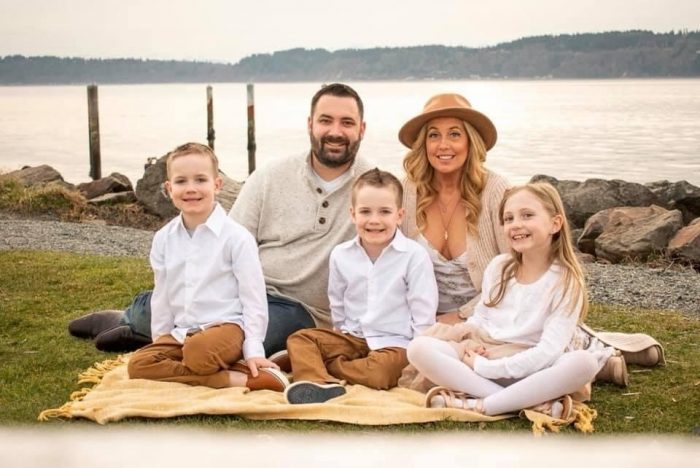
Rachel Robinson and her family were on a family camping trip when she started to notice something was amiss with her son, Eli. He appeared pale, a hint of green to his complexion, and he was covered in bruises. His identical twin seemed fine, which added to Robinson’s concern.
She called their pediatrician, and they were advised to go to Seattle Children’s as soon as possible. After a blood test, doctors discovered something unimaginable. Eli had cancer.
“It’s something you think is never going to happen to you,” Robinson said. “You wonder if you did something wrong. It was surreal.”
One day at a time
“That first day was a whirlwind,” Robinson said.
As Eli and his family were taken up to the Cancer Care Unit, Robinson remembers one of the nurses reaching out to them with gentle hands. She was still in shock, and everything was happening so quickly.
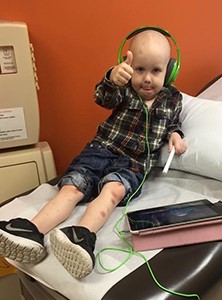
“It’s going to be okay,” she recalled the nurse saying to them. “He’s in good hands.”
She must have understood the devastation their family was going through, and her kind words helped reassure them.
“We jumped right in,” she said. “It was all we could do. In the beginning, you’re giving your kid’s life to a stranger. You trust them like an extension of your family, and soon they become like your family. We felt really lucky to have Seattle Children’s so close to home.”
Just 10 days before his third birthday, Eli was diagnosed with high-risk leukemia.
As they arrived on the Cancer Care Unit, Robinson recalls passing a sign as they stepped off the elevator. It was a plaque in recognition of Seattle Children’s Cancer and Blood Disorders Center being named one of the best cancer programs in the nation by U.S. News and World Report. Consistently, ranked as one of the nation’s best cancer programs, Seattle Children’s doctors are global leaders in developing new treatments for children at all stages and risk levels of the disease.
“It reassured me that we were in the right place,” she said. “It was more than a sign.”
A long journey ahead
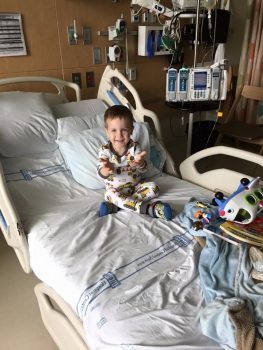 Eli underwent 35 spinal chemotherapy procedures, numerous infusion chemotherapy sessions as well as daily oral chemotherapy. They traveled back and forth from their home in Marysville for treatment. Each time they stayed inpatient at the hospital, Robinson and her husband rotated who stayed with Eli. Robinson stopped working and put everything else on pause.
Eli underwent 35 spinal chemotherapy procedures, numerous infusion chemotherapy sessions as well as daily oral chemotherapy. They traveled back and forth from their home in Marysville for treatment. Each time they stayed inpatient at the hospital, Robinson and her husband rotated who stayed with Eli. Robinson stopped working and put everything else on pause.
“You drop everything when something like this happens,” she said.
Her sole focus was her family and helping Eli undergo life-saving treatment.
On Jan. 5, 2019, Eli completed his last round of chemotherapy.
“Every day we were at Seattle Children’s, I felt like we were the only people in the hospital,” Robinson said. “They saved his life. We are so incredibly fortunate. Looking at him today, you would never know what he went through.”
A smiling face
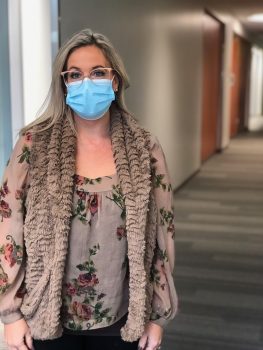 Today, Robinson wants others family to know they too are in the right place. As patients and families walk into Seattle Children’s North Clinic in Everett, they see the warm and inviting eyes of Robinson.
Today, Robinson wants others family to know they too are in the right place. As patients and families walk into Seattle Children’s North Clinic in Everett, they see the warm and inviting eyes of Robinson.
“I can’t imagine working for a better organization,” Robinson said.
Serving as a family services coordinator, Robinson is usually one of the first faces families see when they arrive in the clinic. She knows all too well how families may feel because she’s been in their shoes before. It’s one of the reasons she wanted to work at Seattle Children’s. To help other families in need.
“A lot of times, people are coming to see us, and they may not want to be there. It could be the worst day of their lives, like it was for us,” Robinson said.
Just like that nurse did for her family, she wants to be sure she makes every family she interacts with feel like they are in the best place possible.
“We want to see your child thrive,” she said. “I only get so much time with people. I usually don’t know the reason why they are at Seattle Children’s, and so I try to be as positive I can be. I loved when the registration people knew Eli’s name. I try to do the same. I want people to feel as if I’m part of their team. I want people to feel comfortable. Hopefully, you’ll never see us, but if you do, we’re here for you.”
Hope for the future
Eli and his family still travel to Seattle Children’s for appointments, though now they are less frequent. On Jan. 5, he’ll reach a big milestone. He’s now in the Cancer Survivor Program and is two years post treatment.
“My hope is that the High-Risk Leukemia Program can change the paradigm of care for children with hard to treat leukemia in that top physicians and researchers can implement the latest diagnostic technologies and novel therapies to bring personalized care to each patient,” said Dr. Todd Cooper, co-interim division chief of Seattle Children’s Cancer and Blood Disorders Center and director of Seattle Children’s High-Risk Leukemia Program. “We hope that we can fulfill our mission to leave no stone unturned in a child’s care and offer hope to children like Eli.”
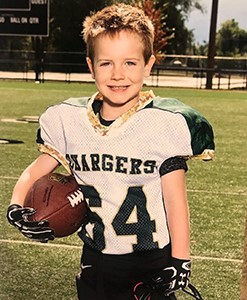 Today, Eli is a happy and healthy 8-year-old. According to Robinson, he’s thriving. He is kind and enjoys things children enjoy, like video games and football.
Today, Eli is a happy and healthy 8-year-old. According to Robinson, he’s thriving. He is kind and enjoys things children enjoy, like video games and football.
“I don’t want Eli to be defined by cancer,” Robinson said. “He had cancer, but it’s not who he is. I don’t want people to see him as a cancer kid. It’s part of his story, but not his whole story. He’s an inspiration.”
Robinson hopes other families know they are in good hands when they come to Seattle Children’s.
“I get to be an advocate for patients and families,” she said. “I get to be their voice. My goal will always to be help kids, and I’m so grateful I have that opportunity.”
About Seattle Children’s High-Risk Leukemia Program
Seattle Children’s High-Risk Leukemia Program brings together a team of top experts in all disciplines specific to a child’s unique needs to provide seamless, coordinated care. They are internationally recognized for improving care and cure rates for high-risk leukemia, and are leaders in national research groups such as the Children’s Oncology Group, the largest pediatric oncology consortium in the world.
Seattle Children’s treats more children, adolescents and young adults with high-risk leukemia each year, than any other hospital in the Pacific Northwest.
High-Risk Leukemia Second Opinion Service
If a doctor at another hospital or clinic has diagnosed your child with high-risk leukemia, you can request a second opinion with us. Our High-Risk Leukemia Program provides multidisciplinary consults with pediatric oncologists, and our bone marrow transplant and immunotherapy teams. Contact [email protected] or 206-987-2106.
Leukemia Clinical Trials
For a list of leukemia clinical trials, visit Seattle Children’s Current Research Studies website.

